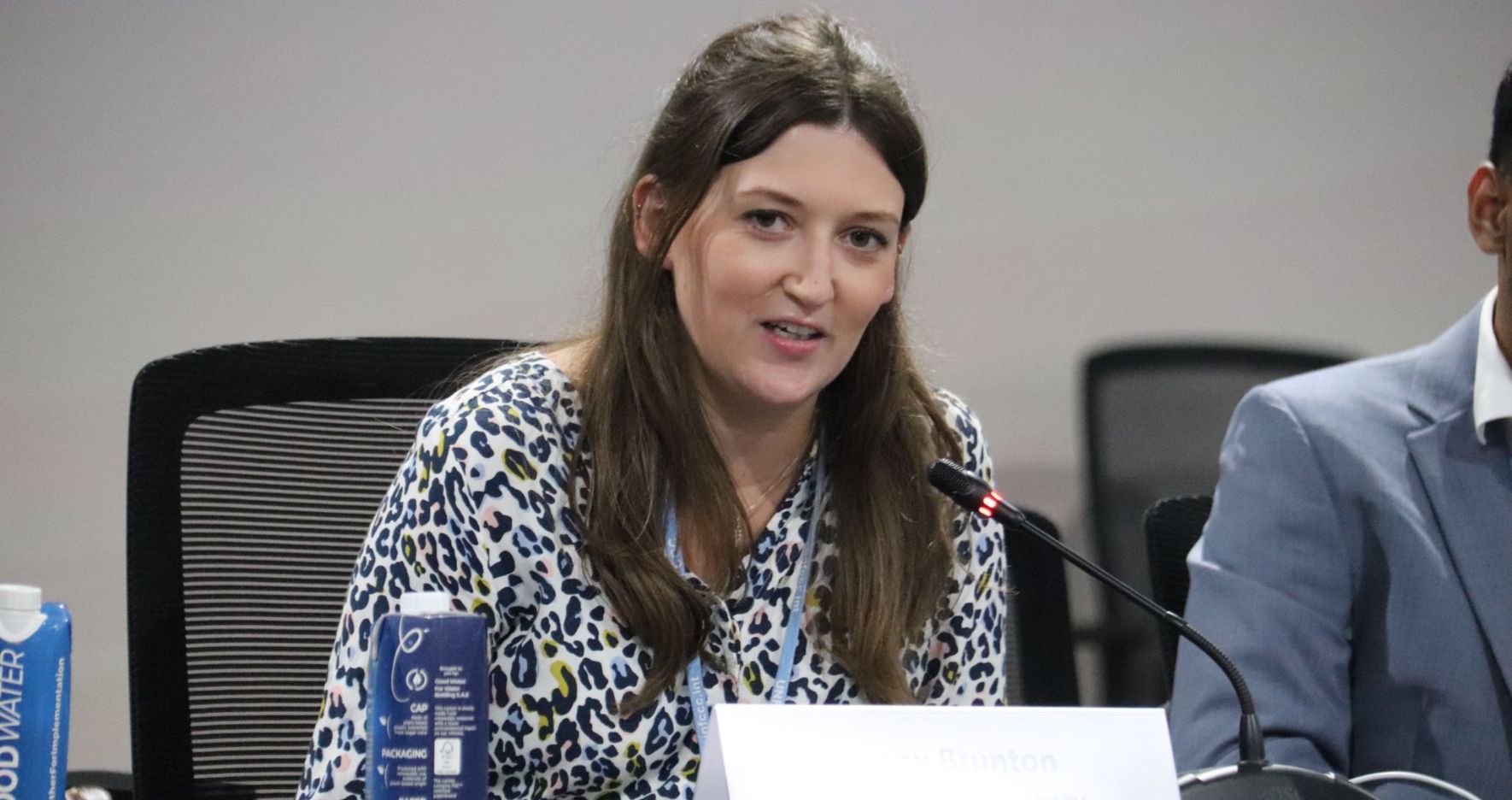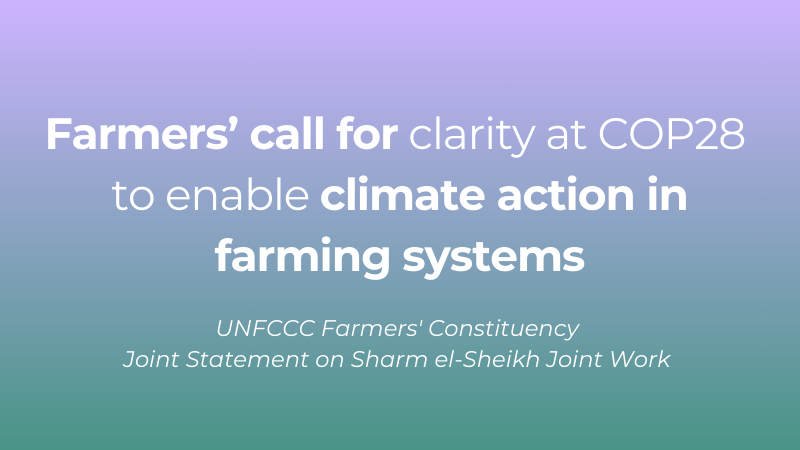The Farmers’ Constituency strongly supported the decision to establish the four-year Sharm el-Sheikh joint work on implementation of climate action on agriculture and food security. This is in line with the Farmers’ Constituency’s desire for a body under the convention to deal with all aspects of agriculture and perform coordinating roles that further global climate action. Farmers’ direct participation in this process is instrumental in raising global climate ambition for our sector, releasing the great potential that agriculture and its people have in the fight against climate change and in empowering the world’s farmers to adapt to its ongoing impacts whilst ensuring food security.
There is no one size fits all - a multifaceted approach to agriculture and food systems is needed. The diversity of farming systems, environmental, economic, and social dimensions of agriculture and food systems must be recognised. Research, innovation, adaptation, and mitigation measures should reflect local and national circumstances. These must be farmer led, whilst also being accessible, pragmatic, science-based, and scalable to ensure fast and effective adoption and boost farmer-driven solutions.
Parties must focus on the need to finalise and agree the roadmap, in a timely manner, to ensure that we can move forward constructively to implementation which allows farmers to plan practical actions to address the climate crisis.
Online Portal
The online portal should:
- enhance the sharing of information and experiences on agriculture and climate change.
- recognise the local knowledge and practical expertise of farmers in designing and implementing solutions.
- showcase knowledge exchange between farmers on practical actions that can be taken at local levels because farmers learn best from other farmers and provide farmer case studies as highlighting locally appropriate technologies and innovations is seen as necessary and beneficial.
- pool existing resources and information, including lesser-known regional projects and grassroots research. There is, and has been, extensive work on agriculture and climate change and providing a recognised platform for this knowledge would provide farmers, and decision-makers, access to a key resource in supporting implementation.
Workshops
The Farmers’ Constituency believes the following workshop topics are necessary to support climate action for food security and agriculture. These workshops should explore how:
Delivering finance for implementation of climate action in agriculture
- The quantity of climate finance could be increased from current levels to reflect the realities of the mitigation and adaptation challenges facing farmers, including the doubling of adaptation finance. Different approaches could be assessed to establish a commitment to provide financial support to farmers. How to ensure that climate finance is available at all levels to individual farmers, and farmer’s organisations and that this finance is not skewed towards limited action, such as mitigation, but instead covers scalable solutions in both mitigation and adaptation.
- The quality of climate finance could be improved, so that the accessibility, availability and predictability of support significantly improved in a fair, just and timely manner.
- Additional elements can be encouraged including more projects with community-based implementation, how more farmers organised structures can become Executing Entities, and how finance for developing project proposals can be more affordable and secure.
- In 2019, the KJWA workshop report on ‘Improved soil carbon, soil health and soil fertility under grassland and cropland as well as integrated systems, including water management’ noted that ‘one source of finance could come out of recognition of soil carbon sequestration in carbon markets.’ We would like to revisit the state of play, risks, and opportunities of the voluntary carbon market to enable investment for implementation.
The role of innovation in providing climate solutions for agriculture
- Considering the role of new technologies is consistent with Decision CP.27 item #2 (d) we “recognize the importance of the continued involvement of scientific and technical knowledge in transforming the agriculture sector, enabling conditions, the crucial role of farmers, youth, local communities and indigenous peoples, including gender considerations, and of meeting the needs of farmers and food systems;”
- To deliver adaptation and mitigation, innovative technology and scientific advice is essential which is locally appropriate and meets farmers’ needs, accompanied by capacity building, technical and financial assistance to support the adoption of practices and technologies.
- To support effective implementation of climate commitments, objectives must be achievable and quantifiable with clear pathways to meet the targets. Farmers can be leveraged to support the data-driven approach (e.g., soil mapping). Governments also need to ensure that farmers are fairly compensated, that there is encouragement for and confidence in data collected on farm, that the use of such data is transparent and appropriate, for the benefit of farmers, governments and others.
Exploring a Just Rural Transition and Food Systems
- A Just Transition for agriculture must ensure that farmers are central to the transition, be farmer-led and promote fairness and transparency across the value chain. Agriculture must remain economically and socially viable and provide a fair income and decent working conditions for farmers. Farmers must have a voice in the shaping of decisions that affect them. Government support for agricultural development and innovation through customised financial schemes would allow farmers to make fair and effective investments at farm level to contribute to the transition.
- The UN Food Systems Summit, the Committee on Food Security etc offer scope for complementary work alongside the Sharm el-Sheikh joint work on agriculture and food security.
Need to consider outcomes of Koronivia Joint Work on Agriculture (KJWA)
The Farmers constituency would be very interested in hearing from Parties about how they have used the outputs from the KJWA roadmap. Many topics were discussed such as water and livestock which are of critical importance to the constituency. The sharing experiences on optimisation of the Koronivia outputs to meet national circumstances is of value when considering the implementation of climate action on agriculture and food security.
To justify the establishment of a permanent body for agriculture, the Farmers’ Constituency believes we must see the current, and previous, joint work deliver outcomes which enable climate action for agriculture and food security.
Farmers will be at COP28, and we look forward to working with Parties and other relevant stakeholders at COP28, co-creating agriculture and food systems solutions that benefit farmers, people and the planet.

